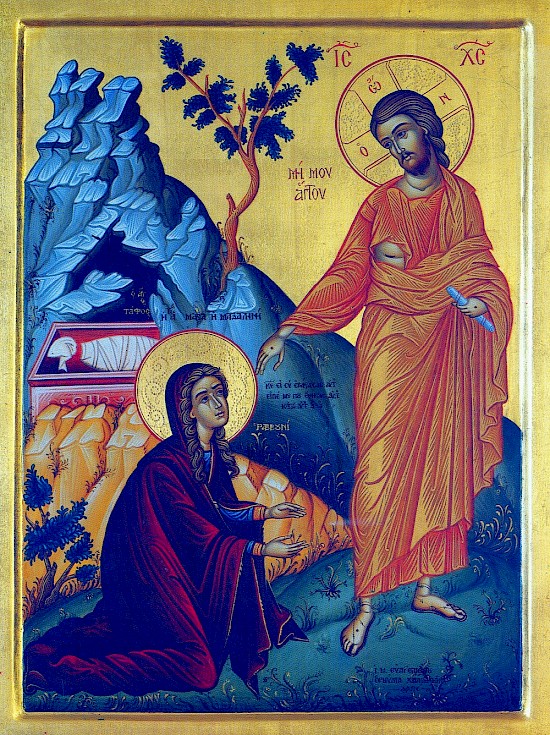
We have read various discussions about the apparent lack of accord among the Gospel narrations of Christ's Resurrection. There have been a number of attempts at demonstrating a concordance among the Evangelists in this regard, but not all have been successful.
I wish to offer some considerations on the subject, and I wish to begin by mentioning the most obvious point of seeming lack of accord.
In Matthew's Gospel, we read that upon being greeted by the risen Lord with the word "rejoice," Mary of Magdala and the other Mary immediately embraced His feet. Nevertheless, we read elsewhere [John 20:11-17] that, when Mary of Magdala was weeping at the empty tomb and did not recognize Christ, but thought that He was the caretaker of the garden. When she did finally recognize Him, she was forbidden to touch Him.
28.04.2019Read more
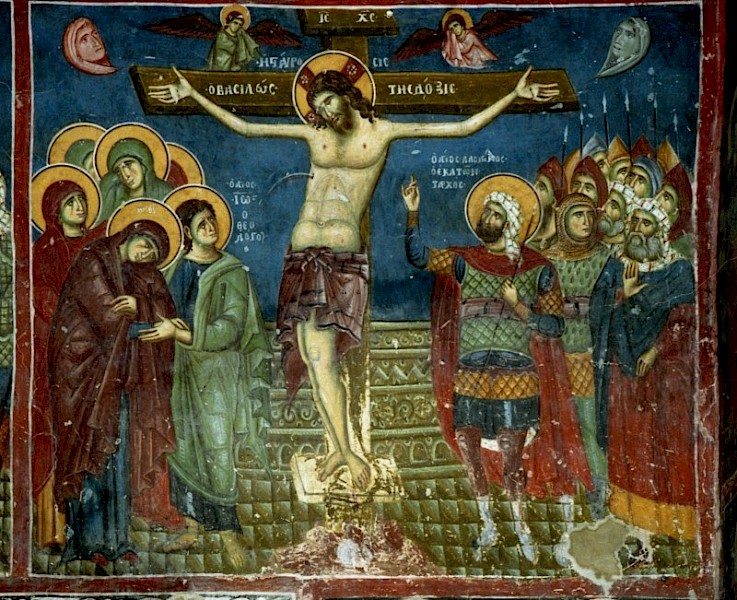
"And when the centurion, who stood near Him,
saw that He so cried out and gave up the spirit, he said,
'Truly, this man was the Son of God'." (Mark 15:39).
Thus began the faith of the centurion. It is clear that this cry of Christ expressed a treasure of moral content in a spirit which the centurion understood. Such a connection between a tormenting cry of the soul and the beginning of a new grace-filled life in one who has heard it, is found repeatedly in the Holy Scripture. We will begin a survey of these places in the Scripture with the most dramatic one, found in the Book of Esdras:
I lifted my eyes, and on my right hand I saw a woman, and behold, she mourned and wept with a loud voice, and was deeply grieved in heart, and her clothes were torn, and she had ashes upon her head.
Then I let my thoughts go and turned and said to her, "Why are you weeping? Why are you so grieved in heart?"
26.04.2019Read more

IF ONE WISHES TO UNDERSTAND the most essential events of the earthly life of the Savior and the people that surrounded Him, in particular the events connected with His trial or with the taking of anyone into custody, it is indispensable to acquaint oneself with the seventeenth chapter of Deuteronomy. There one can recognize the following rules by which society was guided in the arrest and punishment of offenders.
25.04.2019Read more

Today we prayerfully and solemnly remember the Royal entrance of the King of Glory, the Lord Jesus Christ into His “royal capital,” the holy city of Jerusalem.
Noisy was the crowd of Judeans when Christ entered the city before the beginning of Passover. Millions flocked to Jerusalem during those days, and it was already overfilled with people when the ceremonious, royal greeting of the long-awaited Messiah, Savior of the world commenced.
20.04.2019Read more
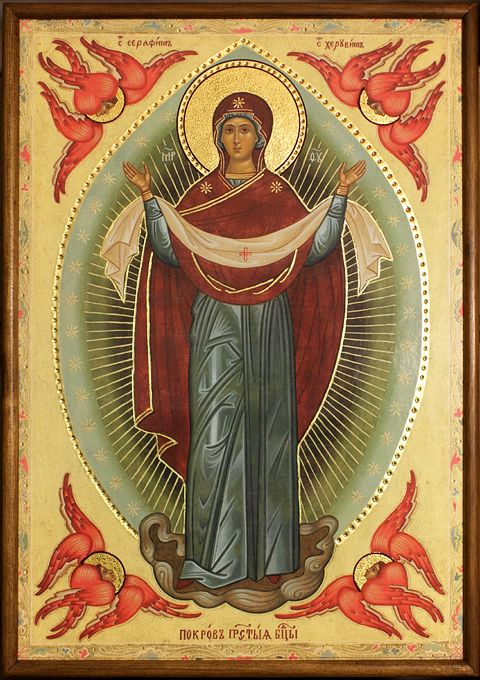
Originally published in Russian in: “Russkij pravoslavnyj kalendar na 1933 god. (Vladimirova: Rus., Tip. Prep., Jova Pochayevskogo, 1932) All Psalms quotes above were taken either from the Coverdale Psalter or the Brenton Septuagint Psalms. - Editor.
Meet it is to magnify Thee,
more honorable
than the Cherubim and incomparably
more glorious than the Seraphim.
I.
THE VENERATION OF THE MOTHER OF GOD DURING HER EARTHLY LIFE.
FROM APOSTOLIC TIMES and to our days all who truly love Christ give veneration to her who gave birth to Him, raised Him and protected Him in the days of His youth. If God the Father chose her, God the Holy Spirit descended upon her, and God the Son dwelt in her, submitted to her in the days of His youth, was concerned for her when hanging on the Cross - then should not everyone who confesses the Holy Trinity venerate her?
Still in the days of her earthly life, the friends of Christ, the Apostles, manifested a great concern and devotion for the Mother of the Lord, especially the Evangelist John the Theologian, who, fulfilling the will of her Divine Son, took her to himself and took care for her as for a mother from the time when the Lord uttered to him from the Cross the words: “Behold thy mother.”
13.04.2019Read more
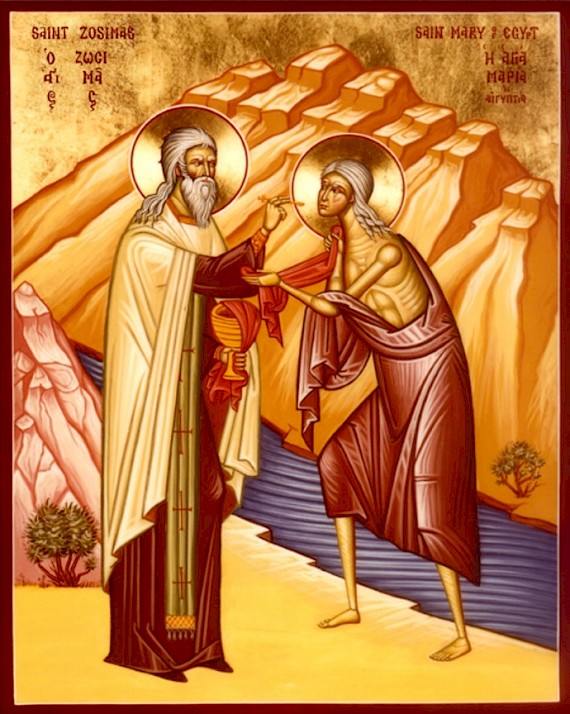
"This kind can come forth by nothing, but by prayer and fasting (Mk. 9:29). So if you will remember, last Sunday, the fourth Sunday of Great Lent, the Gospel proclaimed to us: "This kind can come forth by nothing, but by prayer and fasting." What is "this kind’? If you will remember, brothers and sisters, we were told there about a youth who was possessed and sometimes fell into fire and sometimes into water, as his father said when he brought him to Christ. And Christ said, ‘This kind can come forth by nothing, but by prayer and fasting." This is what kind. The kind which possessed the youth and was casting him down. This unfortunate youth not only knew no rest, but not even life itself. And Christ said, "can come forth/’ This means that it was something separate. Now do we understand this or not?
Brothers, if you just open a newspaper, you will at once understand what "this kind" means. See how many people who, in a state of despair, jump into water in order to end their lives, thinking there is no eternal life. And into fire. Here you find so many who again, out of despair, throw themselves into fire, become human torches in order to burn themselves. It is the same thing: a state of insanity or despondency, or on the contrary, a state of mind which almost reaches madness — human pride. And how many people become victims of those terrible excesses of sex. How many terrible mental conditions there are in which a person commits robbery, murder, which are connected with the terrible greed for money, for power. What is this? It is precisely "this kind." We seem not to participate in it. Oh, if only we would not participate!
13.04.2019Read more

In the Name of the Father, and of the Son, and of the Holy SpiritMore than once, brethren, the fact has been mentioned that on each Sunday in the Great Fast there are other commemorations beside that of the Resurrection. Thus, on this day, the Church glorifies the righteous John of the Ladder, one of the greatest ascetics, which the Church, in speaking of them, calls “earthly angels and Heavenly men.”
These great ascetics were extraordinary people. They commanded the elements; wild beasts willingly and readily obeyed them. For them, there were no maladies they could not cure. They walked on the waters as on dry land; all the elements of the world were subject to them, because they lived in God and had the power of grace to overcome the laws of terrestrial nature. One such ascetic was Saint John of the Ladder.
06.04.2019Read more

Before us is the Cross. This is the Cross of Christ. But on Golgotha there were two more crosses: Christ in the middle and on either side of Him were crucified two thieves. Christ on the Cross performed the sacrifice of redemption for the whole world. But what brought those crucified with Him to these crosses? Their crimes — after all, they were thieves.
What made them thieves? There was a time when they were innocent children and maybe even played together. This was the bright time of childhood. And later, they felt, as each of us does, two opposing forces influencing them: a good one and a bad one. And their will had to yield to either one or the other side. In the beginning they wavered, but later on, because the evil appeared more alluring, they began more and mc/e often to consent to the evil. At first, conscience reproached them, but later it became hardened and stopped tormenting them. And then, without a backward glance, they completely took the side of evil. First, in the realm of will and feelings, and later they fell into open crimes which brought them to these crosses, to death sentences. And here they were both dying. Not only their hours, but even their minutes were numbered. And between them the Lord was dying on His Cross. One of the hanging criminals reviled Him. But the other, on the contrary, silenced the abusive one and said to Jesus, "Lord, remember me when Thou comest into Thy kingdom. And Jesus said unto him, Verily I say unto thee, Today shalt thou be with Me in paradise" (Lk. 23:42-43).
30.03.2019Read more

Brothers and sisters, we have lived this week in the light of last Sunday — the Triumph of Orthodoxy. A wonderful feature was pointed out to us in the Gospel which was then read:
Philip findeth Nathanael, and saith unto him, We have found Him, of Whom Moses in the law, and the prophets did write, Jesus of Nazareth, the son of Joseph. And Nathanael said unto him, Can there any good thing come out of Nazareth? (Jn. 1:45-46).
23.03.2019Read more
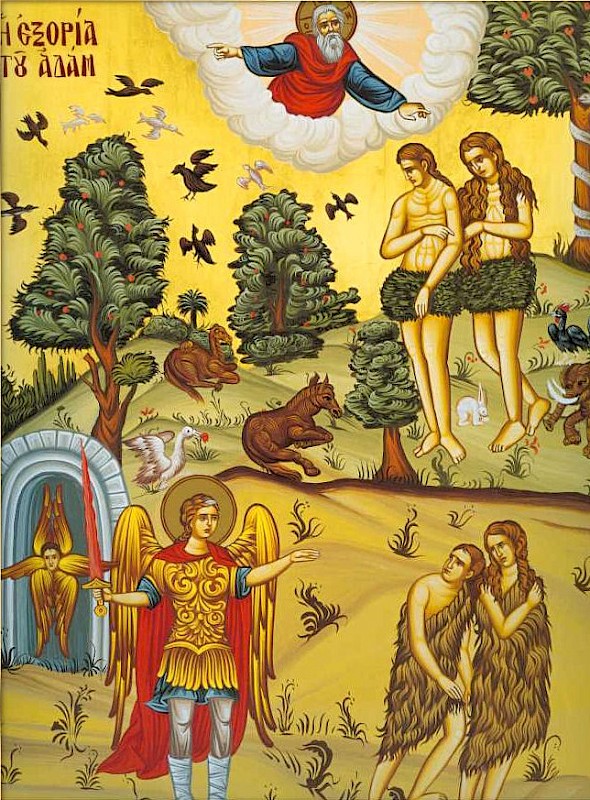
Probably many of you know that in one of the monastery, when there was a quarrel between one of the brothers, between the monk or novice, the spiritual father would not let them read the Lord's Prayer. Why? Because we pray this prayer: "Forgive us our trespasses, as we forgive our debtors." Ie, forgive us our sins (debts that - sins), because we forgive our debtors. Or, insofar as we forgive our debtors. "So," - said the spiritual father of his spiritual son - "if you leave it to your neighbor sins, it means that you ask the Lord that He would not forgive your sins. And I do not want you to pray about it. Therefore until you make up, do not read the Lord's Prayer. " Himself understood that immediately becomes restless and always came to mind: "What I actually Christian, if I do not have the right to read the main Christian prayer?" And it quickly led to realize the necessity to reconcile.
Thus, the Lord's mercy, mercy forgiveness of our sins, posing in full communication with the way we ourselves forgive those who are against us guilty.
10.03.2019Read more










